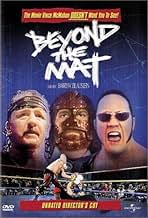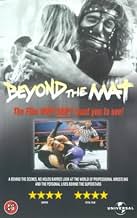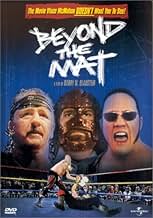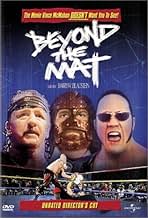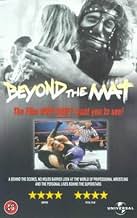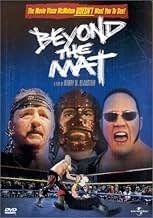IMDb RATING
7.6/10
9.7K
YOUR RATING
A heartfelt documentary focusing on the day-to-day lives of professional wrestlers, some on the rise, some on the wane, and others fighting for their lives.A heartfelt documentary focusing on the day-to-day lives of professional wrestlers, some on the rise, some on the wane, and others fighting for their lives.A heartfelt documentary focusing on the day-to-day lives of professional wrestlers, some on the rise, some on the wane, and others fighting for their lives.
- Awards
- 3 wins & 2 nominations total
James Ware
- Self
- (as Coco B. Ware)
- Director
- Writer
- All cast & crew
- Production, box office & more at IMDbPro
Featured reviews
This is the ultimate film for true fans of pro wrestling. If you have seen and enjoyed "Hitman Hart: Wrestling With Shadows" then you will love this film even more as it is even better!
"Beyond The Mat" is written & directed by life long wrestling fan Barry Blaustien and to be totally honest the film is ground-breaking. It really pulls no punches telling all about the inner workings of the world of pro wrestling.
"Beyond The Mat" focuses on three wrestlers. Terry Funk, who claims to be retiring but is still wrestling today in WCW, Jake "The Snake" Roberts, once a ring great and now nothing more than an out-of-shape, washed up crack head, and Mick Foley, who is now retired. And this is were "Beyond The Mat" gains respect from both wrestling fans and non-wrestling fans as it does not show them as supermen but as real people, with real lives, and real families.
So if you are willing to have you illusions of your favourite stars shattered before your eyes then see "Beyond The Mat" and you will gain a new level of respect for the world of pro-wrestling.
"Beyond The Mat" is written & directed by life long wrestling fan Barry Blaustien and to be totally honest the film is ground-breaking. It really pulls no punches telling all about the inner workings of the world of pro wrestling.
"Beyond The Mat" focuses on three wrestlers. Terry Funk, who claims to be retiring but is still wrestling today in WCW, Jake "The Snake" Roberts, once a ring great and now nothing more than an out-of-shape, washed up crack head, and Mick Foley, who is now retired. And this is were "Beyond The Mat" gains respect from both wrestling fans and non-wrestling fans as it does not show them as supermen but as real people, with real lives, and real families.
So if you are willing to have you illusions of your favourite stars shattered before your eyes then see "Beyond The Mat" and you will gain a new level of respect for the world of pro-wrestling.
You've got to wonder about wrestlers. They're always on the road, they're always carrying knocks and injuries, they don't get paid much (except the few at the absolute top), they get no respect from the public at large, they don't actually compete in the legitimate sense of the word and the vast majority of them are quickly forgotten. Yet nearly all of the wrestlers in Beyond the Mat continue to seek the spotlight. Why? I guess Terry Funk sums it up best: "It's fun."
However, it's a strange type of fun. After all, I'm not sure that most people would class being hit over the head with steel chairs as 'fun'. Nor would most people relish the thought of being thrown off a steel cage. But as the film points out, wrestlers are hardly normal. At the same time, though, they're still people. They have the same problems as all of us. It's just that they earn their living by running around in spandex and by beating the crap out of one another.
Of all the different strands in Beyond the Mat, I like the Terry Funk section the most. It just shows how bizarre wrestling is. Here you have a man in his fifties who has degenerative arthritis and who wakes up in the morning, like many old men, in his y-fronts. Yet in the ring he's a bloodthirsty maniac. But at the same time he's a loving father who cries at his daughter's wedding and he has an excellent rapport with the man who he has his most brutal matches with. As dim-witted as wrestling is, nothing out of the ring is simple.
And the Funk section illustrates the problem that most wrestler face: they can't give up the spotlight. I mean, just take one of Funk's friends, Dennis Stamp. He hasn't wrestled in years but he still trains (by jumping up and down on a trampoline in his underwear) in the vain hope of getting another match. And when he's finally made the referee in Funk's 'retirement' match, he's beside himself with excitement at the prospect of being part of the main event. It seems like when you don't get paid much, when you're forced to do lousy jobs and when no one really knows who you are, the only compensation for such a depressing existence is a few cheers.
But although the film touches upon the dark side of wrestling, it's quite touching seeing Funk trying to persuade his friend Stamp to be part of his match. The man may be vicious in the ring, but outside it he's warm-hearted. And I like the way that when he persuades his friend to be part of his match, and when he walks away, he nearly trips over. Despite everything, he's just a lovable old guy. However, I also like the scene because Stamp is such a fool. He's so desperate to be someone and so desperate to be recognised, that he cuts a promo when he's explaining why he can't make the event ("I'm not booked!). It's as if reality and wrestling are blurred. He can't tell them apart.
Another wrestler who's been messed up by the business is Jake Roberts. He doesn't get on with his daughter and he's forced to pay for his drug habit by wrestling in fourth-rate events in backwater towns. He's even filmed urinating into a bucket and then falling asleep backstage. It really does give a depressing picture of what it is to be a professional wrestler your existence revolves around the road, run down hotels and small towns. No wonder so many of them are screwed up. But Roberts has even more reason to be screwed up than most. He's the product of a rape and his sister was kidnapped and murdered. And he has a terrible relationship with his father. They can barely look at one another. There's no connection there at all. And it's quite shocking hearing Roberts describe how he gave up his dreams just to shove wrestling down his father's throat (his dad was a wrestler and Robert's resolved to be better than him). Suddenly you can see why Robert's created such a compelling character. He was just drawing on his own life. Again reality and wrestling is blurred.
Perhaps the only one in the film that has a decent handle on things is Mick Foley. He has a clear plan (he wants to retire by the age of 35) and he has a solid family to support him. Somehow you know that he's going to be fine. Not that there aren't a few bumps on the way. In one scene he's forced to watch footage of his wife and kids screaming when he's repeatedly hit over the head with a steel chair. It's a real wake-up call. I mean, as entertaining as it is for sadistic bastards like myself, you just can't make you family endure that time after time. But it's his family that will keep Foley on the straight and narrow. However, for the other wrestlers who don't have stable personal lives, they'll have to seek love in cheers and applause. It seems like wrestling is a drug that most wrestlers can't crack.
Not that a few don't try. There's an amusing scene when a wrestler called New Jack, who has four justifiable homicides, auditions for a Hollywood casting agent. The people there are slimy beyond belief. They make the carnies in wrestling look honest in comparison.
But why the film succeeds so emphatically is because everything is just presented as it is. No judgements are made and nobody is looked down upon. Yeah, wrestling may be something on the fringes of society, but the film shows that as weird as it is, the people aren't really that weird after all. They're just people with the same problems we all have.
However, it's a strange type of fun. After all, I'm not sure that most people would class being hit over the head with steel chairs as 'fun'. Nor would most people relish the thought of being thrown off a steel cage. But as the film points out, wrestlers are hardly normal. At the same time, though, they're still people. They have the same problems as all of us. It's just that they earn their living by running around in spandex and by beating the crap out of one another.
Of all the different strands in Beyond the Mat, I like the Terry Funk section the most. It just shows how bizarre wrestling is. Here you have a man in his fifties who has degenerative arthritis and who wakes up in the morning, like many old men, in his y-fronts. Yet in the ring he's a bloodthirsty maniac. But at the same time he's a loving father who cries at his daughter's wedding and he has an excellent rapport with the man who he has his most brutal matches with. As dim-witted as wrestling is, nothing out of the ring is simple.
And the Funk section illustrates the problem that most wrestler face: they can't give up the spotlight. I mean, just take one of Funk's friends, Dennis Stamp. He hasn't wrestled in years but he still trains (by jumping up and down on a trampoline in his underwear) in the vain hope of getting another match. And when he's finally made the referee in Funk's 'retirement' match, he's beside himself with excitement at the prospect of being part of the main event. It seems like when you don't get paid much, when you're forced to do lousy jobs and when no one really knows who you are, the only compensation for such a depressing existence is a few cheers.
But although the film touches upon the dark side of wrestling, it's quite touching seeing Funk trying to persuade his friend Stamp to be part of his match. The man may be vicious in the ring, but outside it he's warm-hearted. And I like the way that when he persuades his friend to be part of his match, and when he walks away, he nearly trips over. Despite everything, he's just a lovable old guy. However, I also like the scene because Stamp is such a fool. He's so desperate to be someone and so desperate to be recognised, that he cuts a promo when he's explaining why he can't make the event ("I'm not booked!). It's as if reality and wrestling are blurred. He can't tell them apart.
Another wrestler who's been messed up by the business is Jake Roberts. He doesn't get on with his daughter and he's forced to pay for his drug habit by wrestling in fourth-rate events in backwater towns. He's even filmed urinating into a bucket and then falling asleep backstage. It really does give a depressing picture of what it is to be a professional wrestler your existence revolves around the road, run down hotels and small towns. No wonder so many of them are screwed up. But Roberts has even more reason to be screwed up than most. He's the product of a rape and his sister was kidnapped and murdered. And he has a terrible relationship with his father. They can barely look at one another. There's no connection there at all. And it's quite shocking hearing Roberts describe how he gave up his dreams just to shove wrestling down his father's throat (his dad was a wrestler and Robert's resolved to be better than him). Suddenly you can see why Robert's created such a compelling character. He was just drawing on his own life. Again reality and wrestling is blurred.
Perhaps the only one in the film that has a decent handle on things is Mick Foley. He has a clear plan (he wants to retire by the age of 35) and he has a solid family to support him. Somehow you know that he's going to be fine. Not that there aren't a few bumps on the way. In one scene he's forced to watch footage of his wife and kids screaming when he's repeatedly hit over the head with a steel chair. It's a real wake-up call. I mean, as entertaining as it is for sadistic bastards like myself, you just can't make you family endure that time after time. But it's his family that will keep Foley on the straight and narrow. However, for the other wrestlers who don't have stable personal lives, they'll have to seek love in cheers and applause. It seems like wrestling is a drug that most wrestlers can't crack.
Not that a few don't try. There's an amusing scene when a wrestler called New Jack, who has four justifiable homicides, auditions for a Hollywood casting agent. The people there are slimy beyond belief. They make the carnies in wrestling look honest in comparison.
But why the film succeeds so emphatically is because everything is just presented as it is. No judgements are made and nobody is looked down upon. Yeah, wrestling may be something on the fringes of society, but the film shows that as weird as it is, the people aren't really that weird after all. They're just people with the same problems we all have.
I've seen this movie a few times and as a wrestling fan for over 20 years I was glad to see a movie that showed a glimpse of what goes on behind the scenes. Blaustien does an amazing job and it was no surprise that it was seriously being considered for an Academy Award nomination (sadly it never ended up being actually nominated).
Wrestling fans have had to defend their love of the art of pro wrestling for many years. When the topic would come up that I am a wrestling fan I would be faced with the same idiotic question, with a tone of disbelief in their voice, "You know it's fake, right?". My response has always been to follow that question with "And what is your favourite TV show?" I usually get an answer like "Friends" or something similar and I then mockingly explain to them that Rachel and Ross never dated and Monica and Chandler are not really married and that that isn't even their real names. Soon they began to see the stupidity of their proclaiming that wrestling is fake. Whew, sorry, kind of went on a rant there.
Blaustien's film allows non wrestling fans to see exactly how "fake" wrestling can be. The blood, sweat and hard work that these athletes and their families endure is vividly shown. We finally see a human side of the often larger than life characters that these men and women of the squared circle portray.
One thing that I found very profound was the drab, dark and gloomy colours Blaustein used in segments showing that human side as opposed to the colourfulness of the slick production of the athletes performing. We go from the glamorous pyro and bright lights of a live Pay per View event to shots of the wrestlers in their concrete, black and white, dirty and sweaty dressing rooms. I don't know if the director did this on purpose but I thought it was quite effective.
Bottom line this movie is a must for any fan of wrestling but I feel it is even more important to the non-wrestling fan interested to see why all these people watch this "fake" form of entertainment.
Wrestling fans have had to defend their love of the art of pro wrestling for many years. When the topic would come up that I am a wrestling fan I would be faced with the same idiotic question, with a tone of disbelief in their voice, "You know it's fake, right?". My response has always been to follow that question with "And what is your favourite TV show?" I usually get an answer like "Friends" or something similar and I then mockingly explain to them that Rachel and Ross never dated and Monica and Chandler are not really married and that that isn't even their real names. Soon they began to see the stupidity of their proclaiming that wrestling is fake. Whew, sorry, kind of went on a rant there.
Blaustien's film allows non wrestling fans to see exactly how "fake" wrestling can be. The blood, sweat and hard work that these athletes and their families endure is vividly shown. We finally see a human side of the often larger than life characters that these men and women of the squared circle portray.
One thing that I found very profound was the drab, dark and gloomy colours Blaustein used in segments showing that human side as opposed to the colourfulness of the slick production of the athletes performing. We go from the glamorous pyro and bright lights of a live Pay per View event to shots of the wrestlers in their concrete, black and white, dirty and sweaty dressing rooms. I don't know if the director did this on purpose but I thought it was quite effective.
Bottom line this movie is a must for any fan of wrestling but I feel it is even more important to the non-wrestling fan interested to see why all these people watch this "fake" form of entertainment.
This great documentary goes behind the scenes and shows us a side of wrestling that we rarely get to see. In particular, it focuses on three legendary wrestlers, and their stories should provoke a wide range of emotions from every viewer. There are other stories as well, but these were generally much less interesting, and the film works best when the focus is on Mick Foley, Terry Funk, or Jake Roberts. Their stories were all compelling, and wrestling-haters who are usually so quick to dismiss this business as "fake" should take a look at this movie and see just how real it can be.
Love them or leave them - misfit politicians, wayward spouses, and yes, professional wrestlers. Perhaps no other spectacle involves personalities as much as professional wrestling and Barry Blaustein's insightful "Beyond the Mat' explores those who thrill us with their lust for mayhem. Men and women with self destructive appetites are drawn into this entertainment venue - those who make a profit like the billionaire promoter Vince McMahon are called smart and shrewd, those who are swallowed up by their maladaptive behavior like the pathetic Jake'the Snake' Roberts are simply called mad. "Beyond the Mat" doesn't uncover anything we don't already know - the loud-mouth, hyped interviews, the staged choreography of flying bodies and colliding men against steel, and the spurting blood sacrificed in the name of violence. What we do see are the showmen who strut their stuff inside the ring, more dedicated to their brotherhood and craft than you can imagine. The battle wearied Terry Funk is a throwback to the self-managed, up-close-and-personal hero that Blaustein and a good number of his generation grew up with. The much younger Mick 'Mankind' Foley is a creation of the media driven World Wrestling Federation, a syndication leap years away from the Amarillo, Texas of Terry Funk. The deeply hurting Jake the Snake has fought so many battles in his long and troubled life that his only solace is crack cocaine and fighting in the ring. But the blood that Funk and Mick and Jake spill is the same blood of wanton brutality. It is the spectacle of harm and harming others. And yet in a cruel and twisted way, "Beyond the Mat" reminds us that wrestlers are as normal as anyone, just different. 'Mankind' and 'The Rock' can talk pleasantries before a match, before each tries to pulverize the other in front of their stunned wives and children. Terry Funk, as a gesture of forgiveness, repeatedly begs an old nemesis to referee his supposedly final match - a match in which he knows he will lose and will get brains bashed in. "Beyond the Mat' is a well made chronicle of wrestlers who care less if they win or lose (the promoters see to that) but more on how they play the game.
Did you know
- TriviaWrestling legend Roddy Piper described this film as "The best documentary ever made on professional wrestling."
- Quotes
Jake Roberts: My mother was 13 years old when I was born. Why? Because my dad raped a little girl that was in a room asleep. My dad was going out with my mother's mother. There you go. There's some bones for Jake the Snake.
- Crazy creditsClosing dedication: This film is dedicated to my wife, Lorrie and our children, Kasey and Corey, who have stood by patiently with love and support as I blabbed about wrestling for the last five years.
- Alternate versionsThe DVD edition of Beyond the Mat has several minutes of deleted footage, plus audio commentaries by Mick Foley & Terry Funk
- ConnectionsFeatured in WatchMojo: Top 10 Controversial Documentary Movies (2015)
Details
- Release date
- Country of origin
- Official site
- Language
- Also known as
- Beyond the Mat
- Filming locations
- Production companies
- See more company credits at IMDbPro
Box office
- Budget
- $500,000 (estimated)
- Gross US & Canada
- $2,053,648
- Opening weekend US & Canada
- $9,532
- Oct 24, 1999
- Gross worldwide
- $2,053,648
- Runtime
- 1h 42m(102 min)
- Color
- Sound mix
- Aspect ratio
- 1.85 : 1
Contribute to this page
Suggest an edit or add missing content


